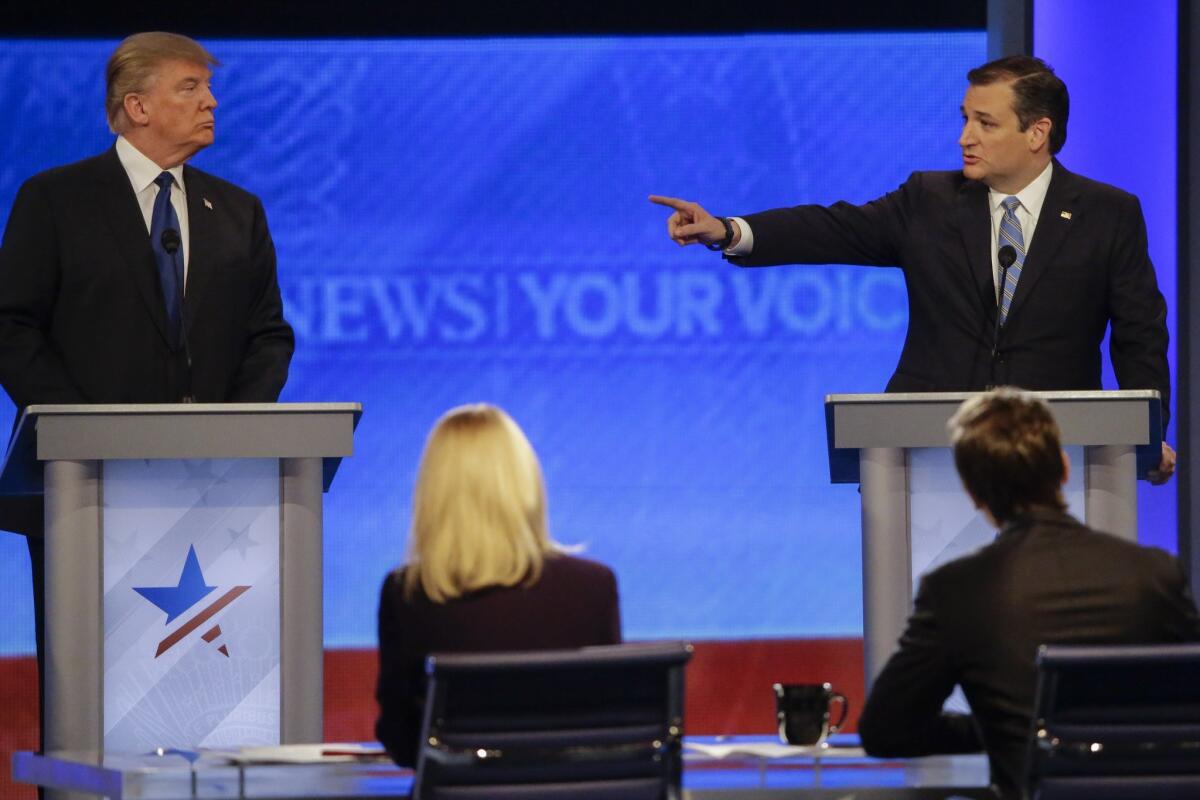Cruz is scary, Trump is dangerous

Republican presidential candidate, Sen. Ted Cruz, R-Texas, points at Republican presidential candidate, businessman Donald Trump during a Republican presidential primary debate on Feb. 6, 2016.
- Share via
The two leading candidates for the Republican presidential nomination held a spirited debate over foreign policy last week, and the differences were striking.
Donald Trump would cozy up to Russian President Vladimir Putin, whom he’s praised as “a strong leader;” Texas Sen. Ted Cruz would escalate our new Cold War with Russia. Trump wants to renegotiate President Obama’s nuclear deal with Iran; Cruz promises to “rip [the agreement] to shreds on day one.” Trump says he’d try to broker a peace agreement between Israel and the Palestinians; Cruz says he’s not interested in talks and would back Israeli Prime Minister Benjamin Netanyahu to the hilt.
See the pattern? Trump wants to make deals, and doesn’t much mind who’s across the table — Russian autocrat or Iranian mullah. Cruz doesn’t want to negotiate, he wants to pick sides.
Those are the differences. But there are similarities too.
When it comes to Islamic State, Trump and Cruz are on the same page — and neither has much of a strategy to offer. They have both suggested that intensified U.S. bombing can win the war. (It can’t.)
Trump says he’d aim to kill terrorists’ families, which would be a war crime. Cruz says he’d “carpet bomb” Islamic State strongholds — a potential war crime, since it would needlessly kill civilians.
Neither cares much who rules Syria in the end, as long as it’s not Islamic State. “We have no dog in the fight,” Cruz has said. Trump says he’d let Putin sort it out.
And while they both do their best to sound ferocious, neither wants to deploy U.S. ground troops. In that sense, Trump and Cruz are rather minimalist — just like Obama.
The rise of the two “outsider” candidates has been bad news for Republican internationalists, the hawkish conservatives who have dominated GOP foreign policy since World War II. Internationalists, who include such figures as former Gov. Mitt Romney and Sen. John McCain, think Obama has been too cautious about using U.S. power overseas. Many of them think the U.S. should be doing more in Syria — for example, setting up (and defending) “safe zones” for the opposition.
But that’s not where most GOP voters are this year. The internationalists had two favorite candidates, former Gov. Jeb Bush and Sen. Marco Rubio, but the former’s already out and the latter isn’t faring too well.
“Much of the country is clearly not where Republican internationalists would like it to be,” said Robert Kagan, a former adviser to Romney. “The American people, in both parties, are in a mood for retrenchment.”
Want proof? Last month, Trump not only called the 2003 invasion of Iraq “a big fat mistake,” he said the George W. Bush administration “lied” to sell the war to the public. Republican voters barely blinked.
Trump’s foreign policy departs from GOP orthodoxy on a host of issues. He wants to demand that Germany, South Korea, Japan and Saudi Arabia increase payments to the U.S. for military protection, moves that would strain those traditional alliances. He wants to slap tariffs on goods imported from China and Mexico, which would almost surely set off an expensive trade war. And, of course, he says he’ll force Mexico to pay for his wall on the border, although he’s never explained how.
Cruz, too, has called the Iraq invasion a mistake. He hasn’t accused Bush of lying, but he has accused “Washington neo-cons,” shorthand for the GOP neo-conservatives who backed the Iraq war, of indiscriminate “military interventionism.”
His favorite example: the overthrow of Libyan dictator Moammar Kadafi in 2011. In Cruz’s view, the United States shouldn’t have helped topple Kadafi; it should have protected him.
“Kadafi was a bad man, he had a horrible human rights record. And yet … he had become a significant ally in fighting radical Islamic terrorism,” Cruz argued last year.
Cruz believes the United States should relegate human rights concerns to a back burner, especially when it comes to the Middle East.
So if the GOP race comes down to a choice between Trump and Cruz, what’s an internationalist-minded Republican to do? It looks like an unappetizing choice to me, but I’d say: Choose Cruz.
Cruz is scary, but Trump is dangerous. Cruz’s soft spot for pro-American dictators would actually be a return to the conservative orthodoxy that prevailed before Ronald Reagan injected democracy promotion into GOP foreign policy.
But Trump, who has a distinct authoritarian streak, seems to admire autocrats like Putin even when they’re not pro-American.
Kagan, who is writing a history of U.S. diplomacy, agrees that Cruz is the better option.
“Trump is a throwback to the 1920s and 1930s view that the world can go to hell and it’s not our problem,” he said. “If Hitler were rampaging across Europe, Trump would say — as many said at the time — that he’s someone we can do business with.”
And if the choice is between Trump and likely Democratic nominee Hillary Clinton?
Kagan, who also worked in the Reagan administration, says he’d vote for Clinton.
Twitter: @doylemcmanus
Hoy: Léa esta historia en español
Follow the Opinion section on Twitter @latimesopinion and Facebook
MORE FROM OPINION
Is America on the brink of returning to torture?
Why a ‘smoking age’ of 21 is a bad idea
For Democrats, one thing is worse than President Trump: President Cruz
More to Read
A cure for the common opinion
Get thought-provoking perspectives with our weekly newsletter.
You may occasionally receive promotional content from the Los Angeles Times.










